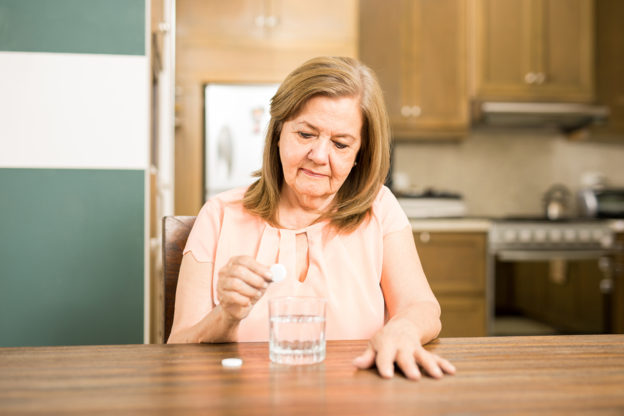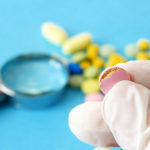By David Blyweiss, M.D., Advanced Natural Wellness
May 26, 2017
- Why you’re probably deficient of this vital nutrient
- 3 common meds that drain B12 from your body
- Boost your levels with this dual-delivery pathway
Vitamin B12 deficiency isn’t something we should have to deal with here in the U.S. Still, it’s become a pretty big problem – even among people who get plenty of vitamin B12 in their diets.
That’s right. Even if you eat a lot of vitamin B12 rich foods you could be deficient. In fact, you could be low on this nutrient even if take a B12 supplement or multivitamin.
That’s because the large majority of B12 insufficiency isn’t because it’s not readily available in our diets. Rather, somewhere around 60% of deficiencies are a result of malabsorption issues.
If your body can’t absorb vitamin B12 you may experience weakness, fatigue, poor memory, anemia, hearing loss, confusion and nerve problems. In particular, peripheral neuropathy and balance problems are strongly associated with low B12 levels.
Additionally, a deficiency in B12 can increase homocysteine levels. This inflammatory marker is bad news for your heart health.
Open your arteries, improve blood flow for a new health miracle...
Did you know your circulatory system has over 60,000 miles of arteries, veins and other blood vessels, if stretched end to end?
But as you age, your blood vessels undergo changes, which may cause them to stiffen, thicken and get clogged.
GOOD NEWS! Doctors have now identified a “Miracle Molecule” inside your arteries that helps OPEN your arteries and IMPROVE blood flow.
It’s what Dr. Valentin Fuster calls it, "One of the most important discoveries in the history of cardiovascular medicine."To you, that means...
- Healthy blood pressure
- Sharper mind and memory
- Skyrocketing energy and muscular strength
- Increased pleasure and passion in the bedroom
- Improved circulation to every cell and organ in your body
Go here to discover a new natural way to significantly boost the levels of this miracle molecule in YOUR body NOW!
Now, there are many reasons your body may not be absorbing vitamin B12. And some of them may surprise you.
3 Common Meds that Drain Your B12 Levels
Vitamin B12 is bound to protein in your food. But your body can’t use it in this form. The B12 has to be separated from the protein before your body can absorb it. Under normal circumstances, your stomach produces something called “intrinsic factor” that does this for you.
However the system doesn’t always work right. And without this separation process, any B12 you take in will pass through your entire GI tract without ever being released or absorbed.
This is often the case as we get older. But aging isn’t the only reason this happens.
Antacid drugs like Prilosec, Nexium and Pepcid destroy hydrochloric acid production and damage intrinsic factor in the stomach. This literally strips your ability to properly absorb vitamin B12. So if you’re constantly taking these heartburn meds, chances are good you’re running low on this vitamin.
The World's Quickest Solution for Ending Prostate and Urinary Misery
This has recently been revealed to be one of the only real breakthroughs in prostate health.
The seeds of a strange fruit (sometimes called "Chinese Apples") hold powerful phytonutrients that are a revolution in prostate health.
In fact, UCLA and Veterans Administration research have now proved this to be true.
Not only that, but it may be the worlds quickest solution for ending prostate misery.
Simply stated, these phytonutrients represent a huge step beyond beta sitosterol, saw palmetto, and other phytosterols alone.
Simply click HERE if you want to have fast prostate relief...restful, uninterrupted sleep...no more constant "urges to go"...enhanced virility...and optimal prostate support for life.
The most widely used antidiabetic drug, Metformin, can alter vitamin B12 absorption in as little as four months. And about a third of Metformin users go on to develop B12 deficiency. This drug stimulates bacterial overgrowth, which competes with vitamin B12 uptake. It also alters intrinsic factor levels, which further affects B12 absorption.
Nonsteroidal anti-inflammatory drugs (NSAIDs) like aspirin, ibuprofen and naproxen can impair digestion and cause inflammation of the stomach lining (gastritis). Both of these interfere with the release of vitamin B12 from your food.
Boost Your B12 Levels with this Dual-Delivery Pathway
It’s hard to accept the fact that the medications you take might be making you sick. So if you’re taking any of the drugs mentioned above, I urge you to talk to your physician about healthier alternatives.
In the meantime, you absolutely must take measures to boost your vitamin B12 levels.
This being said, only a small percentage of oral vitamin B12 can be absorbed in the absence of intrinsic factor. You can take vitamins and eat vitamin B12 rich foods like wild caught sardines, salmon, scallops, shrimp, lobster and grassfed beef all day long. But without intrinsic factor it won’t help.
If you’re severely deficient, intramuscular injections of vitamin B12 can give you a big boost. But there is also a less expensive – and much less painful – way to increase your levels of this all-important vitamin.
It is a sublingual form of B12 that has dual-delivery pathways.
Sublingual means “under the tongue.” This provides for quicker absorption into the bloodstream. However, when you place something under your tongue, you’re also going to swallow some of it. And that’s where a surprising twist of events occurs…
It turns out the vitamin B12 found in sublingual supplements is not bound to protein. So the separation of B12 from protein never has to occur. Sublingual B12 will pass directly into your system for quick absorption and delivery.
This is good news… an easy and inexpensive way to fight off the negative health effects associated with B12 deficiency. I recommend 1,000 to 2,000 mcg. daily of sublingual Methyl B12,(or methylcobalamin) the most absorbable and usable form to perk up your health and prevent insufficiency.
SOURCES:
Heidelbaugh JJ. Proton pump inhibitors and risk of vitamin and mineral deficiency: evidence and clinical implications. Ther Adv Drug Saf. 2013 Jun; 4(3): 125–133.
Kibirige D, et al. Vitamin B12 deficiency among patients with diabetes mellitus: is routine screening and supplementation justified? J Diabetes Metab Disord. 2013; 12: 17.
Ahmed MA, et al. Vitamin B12 deficiency in metformin-treated type-2 diabetes patients, prevalence and association with peripheral neuropathy. BMC Pharmacol Toxicol. 2016; 17: 44.
Wong CW. Vitamin B12 deficiency in the elderly: is it worth screening? Hong Kong Med J. 2015 Apr;21(2):155-64.
Delpre G, et al. Sublingual therapy for cobalamin deficiency as an alternative to oral and parenteral cobalamin supplementation. Lancet. 1999 Aug 28;354(9180):740-1.







